The venture capital landscape for gaming companies saw a significant shift in 2023. Venture funding was down by a remarkable 69% compared to 2022. This downturn was particularly pronounced in North America, where last year marked the fewest number of venture deals closed since 2020. As a result, many in the industry argue that the default response to video game venture capital requests has become a resounding “no.” Meanwhile, others think 2024 will witness a surge in startup funding.
What will 2024 look like in the VC gaming investing space? And what can emerging studios do to increase their chances of securing funding? In this article, we’ll take a look at the year ahead, see how we got here, and provide advice to founders from some of the top minds in gaming VC.
To inform these insights, we spoke to seven of the leading VCs in the gaming sector: Moritz Baier-Lentz, Partner & Head of Gaming at Lightspeed Venture Partners, Kelly Wallick, Gaming VC Partner at 1Up Ventures, Jere Partanen, Principal at Sisu Ventures, Boyoung Kim, Investor at Griffin Gaming Partners, Michael Fan, Partner at Galaxy Interactive, Ryan You, Partner at Galaxy Interactive, and Kishen Patel, Consumer Tech and Gaming Angel Investor.
The Silver Lining in 2023’s Gaming Investment Downturn
“I’m looking at the same charts as everyone else,” says Moritz Baier-Lentz, Partner & Head of Gaming at Lightspeed Venture Partners. “2023 VC funding activity in gaming — and beyond — was down by almost any metric.”
However, the industry was not without its silver linings. 426 venture deals successfully closed in 2023, showcasing the resilience and adaptability of the gaming sector. This includes big deals with Inworld AI, The Believer Company, Gardens, Proof of Play, Mountaintop, Pahdo Labs, and Fuzzy Bot.
While this pales in comparison to the nearly 1,200 deals that closed over the prior two years, it aligns closely with pre-pandemic trends. So, even amidst this financial slump, some video game studios are navigating the challenges effectively. With VC firms still actively investing and games in development, there’s optimism in the air, pointing to a potentially brighter 2024.
That optimism may be justified. 2024 has already seen a number of big deals close, including $110 million for Build a Rocket Boy and $100 million for Marvel Snap developer Second Dinner. It’s also seen some smaller deals close as well, like the $2 million Obelisk Studio secured from The Games Fund, and a $6.3 million seed round for Talofa Games.
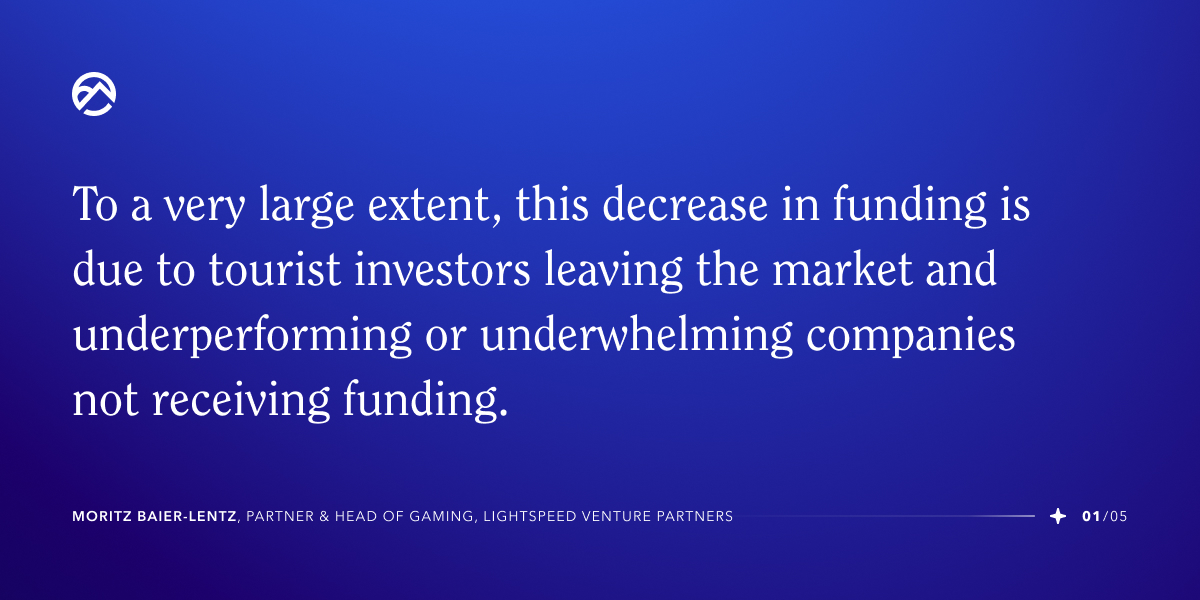
Indeed, Baier-Lentz, emphasizes that 2023’s decrease in funding was largely due to “tourist investors” exiting the market and underperforming companies failing to secure funding. “From where I sit,” he says, “2023 was one of the highest-caliber years of gaming founders approaching and returning to market.” These founders have secured substantial Series A rounds with participation from major players like Riot, Meta, Microsoft, Sony, Nintendo, and more.
Boyoung Kim, an investor at Griffin Gaming Partners, sees similar trends. “Despite the broader market sentiment and the departure of some tourist capital,” she says, “games investing remained active in 2023 for us and our peers that are dedicated to this sector for the long haul. We expect the interest and the capital to back the top entrepreneurs to be resilient through 2024, but the bar has heightened. Investors will demand more progress and more execution discipline, both in terms of timeline and budget.”
The Impact of the 2021 Gaming Boom
To wrap your head around the current state of video game VC funding, it’s crucial to recognize the influence of the 2021 gaming boom and its subsequent slowdown. Kishen Patel notes that the 2021 boom was primarily fueled by expectations surrounding the metaverse and the anticipated adoption of virtual reality (VR), as well as the integration of blockchain-based financial rewards and user-generated content (UGC). During this period, startups didn’t need to justify their valuations based on quantified measures like potential market size or player appeal, because investors believed in the accelerating growth of the gaming industry as a whole.
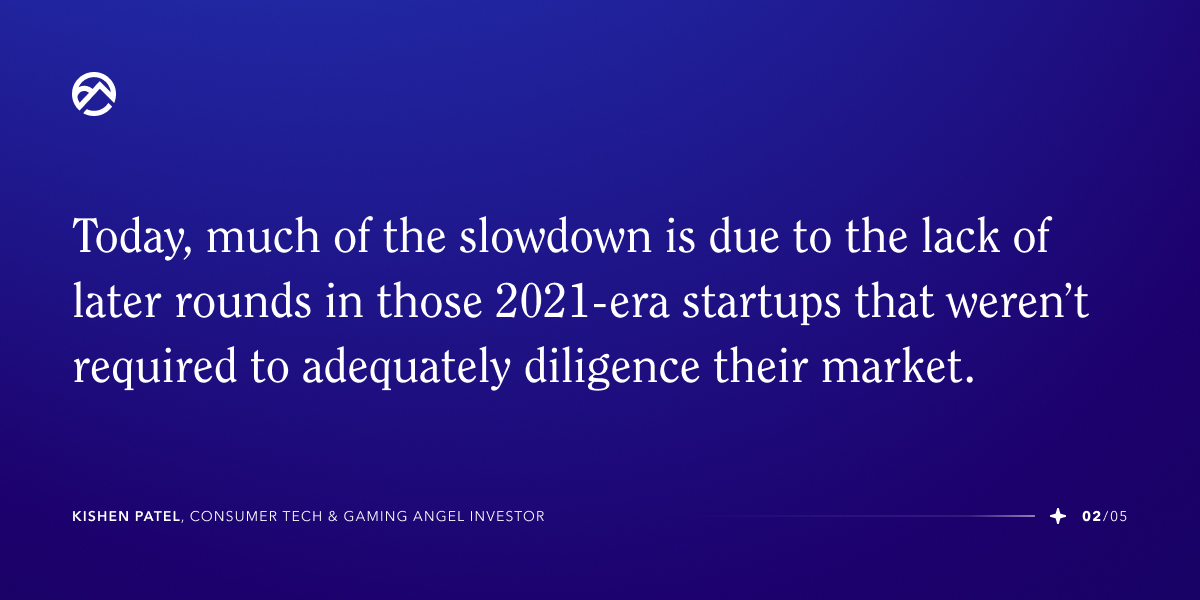
“Today, much of the slowdown is due to the lack of later rounds in those 2021-era startups that weren’t required to adequately diligence their market,” says Patel. These companies were left with revenue and traction metrics that could not substantiate their previous valuations.”
New Expectations for Founders and Teams
Galaxy’s Michael Fan and Ryan You say that before seeking funding, founders should answer some critical questions. These include the amount they are raising, the path to profitability, and the team’s experience and commitment. Fan and You ask, “Have you worked with your team before? How do you know they are up for it? Have you gone through true hardships together? Do you want to build a game, or do you want to build a studio?” Many teams jump into the raising phase without showing that they have a true team in the first place.
Investors are scrutinizing the impact of founders on previous companies and looking for genuine expertise in go-to-market strategies and audience building. Team dynamics are also under scrutiny, and the criteria for evaluating teams and founders is evolving, particularly in the mobile gaming sector.
According to Jere Partanen from Sisu Ventures, the ideal traits of studio founders remain the same, but the bar has been raised. “In the last few years, we tended to see some pedigree chasing,” explains Partanen, “but now investors dig deeper into the actual impact of the founders on the companies they’ve previously been a part of. Having previously been in a meaningful position in a recognized studio may mean little when you need to be scrappy.”
Team balance is also crucial. Founding teams should represent all core disciplines with an equal say and vested interest in the project. For example, explains Partanen, “distribution and publishing are often not properly represented. An ideal founding team is one where all core disciplines have an equal say with proper skin in the game.”
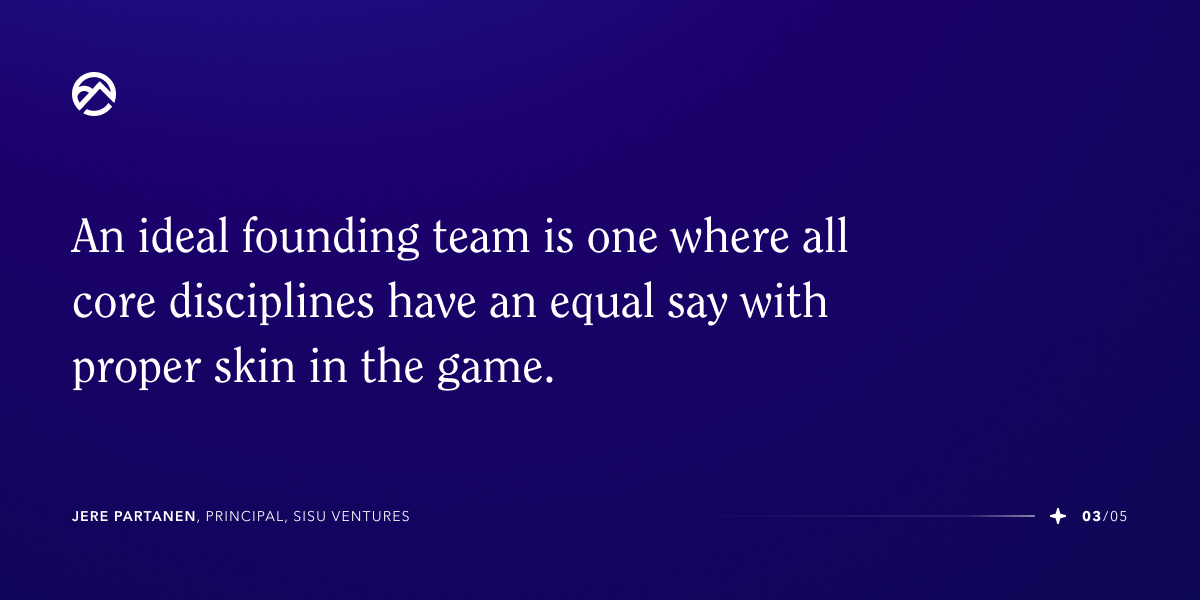
At the end of the day, VCs look for exceptional qualities in founders. According to Michael Fan from Galaxy, startups should aim to be exceptional. Founders must be capable of leading a company while creating a game, and their teams should reflect their vision and dedication. “A startup is a game of exception,” he says, “and by definition, only exceptional people win.”
Key Differentiators Investors Look For
Kelly Wallick of 1Up Ventures has seen thousands of pitch decks during her time in the industry, and 1Up has funded close to 70 indie gaming studios. Here’s her advice for studios seeking funding in 2024:
1. Focus on Innovation
VCs are drawn to startups that demonstrate innovative ideas and approaches. According to Wallick, successful games often push boundaries, experiment with new mechanics, and embrace different art styles. “It’s important to not only keep up with the latest trends but to set your own by constantly innovating and taking calculated risks,” she says. Highlight how your game or studio stands out in the market.
2. Passion and Creativity Matter
Investors value founders who are passionate about their games and possess a creative vision. Wallick has found that these two qualities are actually strong indicators of a team’s potential for success. “It’s those teams that truly understand why they’re making the game and who they’re making it for that stand out to us,” she explains. Show that you understand your target audience and are motivated by more than just financial success.
3. Diverse Representation is Exciting
While the audience of people who play games is incredibly diverse, that hasn’t historically been reflected by the people making the games, or the final products. Wallick sees signs that this is starting to change, and sees lots of opportunity in this untapped space. “More creators are focusing on underserved audiences because they are those audiences,” she says. “I think there’s a lot of potential to encapsulate this and to take a chance on audiences that are relatively mainstream and just really underserved.”
4. Passion Can Be More Potent Than Data
While data is important, Wallick doesn’t see it as the sole determinant of success, especially in the early stages of development. A passionate and dedicated team with a strong vision can be just as valuable as hard metrics. “Passion and creativity for the project are more interesting to us than a purely data-driven approach,” she says, noting that 1Up focuses on early stage and teams more than some other VCs.
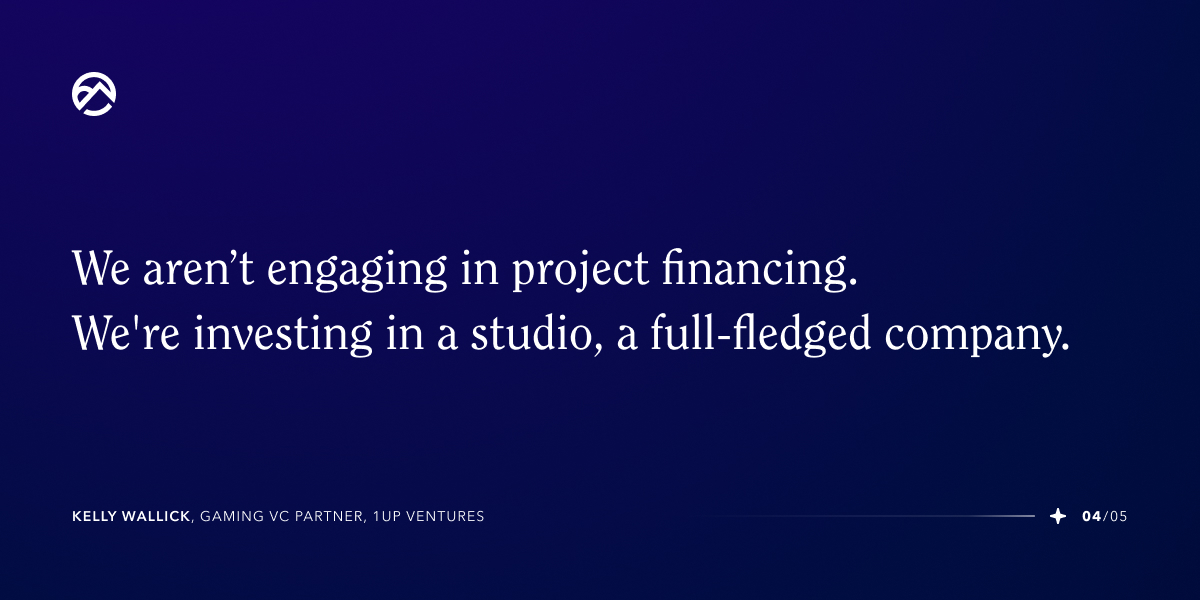
5. Build a Team That Executes
It goes without saying that making games is very complicated, and building a studio is different than building a tech company. “It’s like everything that can go wrong with software and everything that can go wrong with entertainment, all rolled into one,” says Wallick, crediting 1Up General Partner Ed Fries for this insight. Investors are attracted to founders who have a clear sense of purpose and the ability to navigate challenges while still creating something compelling.
“Our focus is undeniably on the end product and the creative journey,” Wallick continues. “However, it’s important to recognize that, theoretically speaking, we’re not engaging in project financing. Rather, we’re investing in a studio, a full-fledged company.”
That leads to a few questions: What will this studio ultimately resemble, and who are the individuals at its helm? What are their ambitions, and what do they aspire to bring to fruition?
In Wallick’s experience, teams that have this vision and are able to execute it from start to finish are rare.
Product is More Important Than Ever
While the gaming VC landscape has evolved, some things will never change. Chief among them? Product. Galaxy’s Michael Fan and Ryan You stress the importance of focusing on product quality from day one. Building a successful gaming company hinges on creating exceptional products, and not all teams excel at this. “Many teams just aren’t great at making great products,” they emphasize. “They are great engineers, amazing sales people, fantastic storytellers… but so rarely you find actual good product people.”
For your game to provide an experience that will achieve in future markets, Fan and You say that you have to be far better than current products. “The cost of change is high,” they explain. “Creating a great product and deeply understanding an audience are synonymous.” The quality of your game and the overall user experience go a long way in getting funding. This means ensuring that the experience is great for the intended audience, and not just what you and your team think.
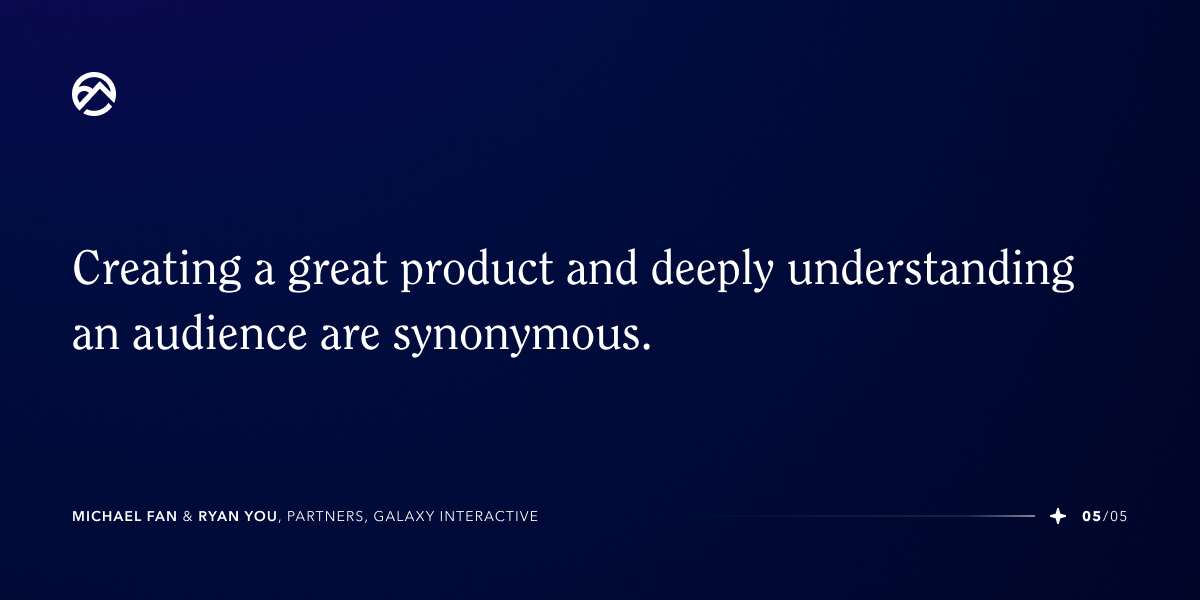
Sticking with product quality, Fan and You say there are two extremely critical things in modern video games, and tech in general, that people miss: Quality assurance (QA) and localization. “QA is so hard and it can make or break a game. Localization is what turns a local cool project into a global franchise. If you do your QA well, going far beyond focus groups, it should give a lot of indications to your marketing team. In any Silicon Valley tech company, you see well-designed test plans with measurable outcomes. In gaming? Well, not so much.”
They emphasize that this is not just about testing. “So many people tell us ‘we have so many fans they’d kill to play for free, we get so much feedback.’ The problems with this? First, a compilation of anecdotal events doesn’t make good and valuable data. Second, it’s good to get a lot of information, but how do you even collect, triage, and process it? What are the action items from them? Third, have you defined a method of validation? How does it impact your roadmap?”
“Many groups talk about how the funding market is challenging to raise in at the moment,” they say, “but they will go into VC calls without having answered many of these core questions well. The bar is far higher than it was in 2021.”
How Solsten Creates an Advantage for Founders
1. Market Sizing With Audience-Level Data
Founders often struggle with validating the potential success of their game concepts. Without proper validation, presenting a game concept to VCs becomes a daunting task. They might miss out on opportunities due to a lack of concrete data to back their claims. This could lead to missed investments and potential failures. Solsten offers a unique value proposition. Through Solsten’s human insights engine, Navigator, which represents the global gaming population, founders can test and validate their game concepts. With this validated data, they can confidently pitch to VCs, highlighting the market potential of their game. This ensures that the VCs have a transparent view of the investment’s size and potential lifetime value.
This is the strategy Mythical Games used to refine the game concept for their hit mobile game NFL Rivals. Mythical, which has raised over $300 million across three rounds of funding, deployed Navigator audiences focused on the intersection of NFL fans and “collectibles” fans. This gave the studio three things: a high LTV player persona that would go on to inform both the game development and marketing approach, data on the number of those high LTV players that Mythical could expect to attract, and the ability to focus on the best themes, art styles, and features that would appeal to these players.
Read our full case study on Mythcial Games’ NFL Rivals here.
2. Unlock Blue Oceans
Studios prioritize founders with a distinct vision for their creations. However, while passion paints a promising picture, it often lacks the solid backing of empirical data. Relying solely on soft metrics like pre-market buzz can be misleading. These data points, though useful, are susceptible to inconsistencies, which may jeopardize the credibility of a founder’s pitch. This could lead to potential missed investments or misjudgments.
Solsten goes beyond conventional soft data and equips founders with authentic audience insights. By offering metrics that influence significant KPIs such as player LTV and UX metrics, Solsten empowers founders. They can now present a vision that’s not only compelling but is also underpinned by dependable data. This way, founders can convincingly demonstrate to investors that their innovative ideas are both visionary and viable.
3. Confirm Product-Market Fit Through Audience Insights
In the early stages of game concepting, many studios rely heavily on intuition and guesswork. Although they often have a clear idea of their intended game and target audience, this approach can be risky. Venturing into development with a raw concept can transform your debut game into an expensive research project. If you proceed without deep insights, you won’t learn the difficult lessons about what your audience truly wants and needs until it’s too late. This lack of foresight can even lead to situations where studios struggle to find a dedicated audience for their game.
By tapping into Solsten’s detailed audience data and research tools, studios can ensure that every facet of their game, from art styles to mechanics, resonates with their target audience’s inclinations. This integration vastly increases the chances of a well-received game and mitigates the risks associated with unchecked development.
Mainframe Industries, which has raised over $30 million, has used a combination of Navigator audiences tailored to their target market along with multiple playtest studies using Solsten’s typing tool. This approach allows them to observe how different personas from their ideal market audience perform during playtests, ensuring that their upcoming MMORPG, Pax Dei, will be developed for the best audience possible.
4. Gain Deep Insights Fast
To achieve profound audience comprehension, studios previously had to invest heavily in research studies or establish a user insights department. For startups, these options demanded a lot of time and money, resources that are often scarce. But without these insights, startups may make uninformed decisions, leading to potential missteps in game development or marketing strategies. Operating on guesswork hinders their potential and can slow down their momentum, making it challenging to compete in a fast-paced market.
Solsten steps in to bridge this gap. It offers studios on-demand access to the kind of in-depth, actionable insights that not even AAA studios have access to. As a result, startups can make informed decisions swiftly, allowing them to move at the speed demanded of small and growth-stage companies.
5. Explore IP Opportunities
Given the fierce competition within discovery channels, it is more difficult than ever for studios to have their games noticed and adopted by users. In this environment, not finding an edge can result in games getting lost in a crowded marketplace. Without effective strategies, studios might miss out on potential audiences, leading to decreased revenue and growth opportunities.
IP licensing presents a potent solution. Solsten makes it easy to see your audience’s most popular IP and identify potential overlaps between your game concept and an IP. This enables studios to choose IP partnerships that can amplify their game’s chances of success, ensuring it not only stands out but thrives in the competitive landscape.
What to Focus on in 2024
The landscape of venture capital funding in the gaming industry is evolving rapidly. Founders looking to secure funding in this environment should focus on these key takeaways:
- Understand Market Dynamics: In the shift from the 2021 gaming boom to the current market expectations, the valuation process has become more grounded. The focus is now on sustainable business models over hype.
- Innovation is Key: Prioritize innovative ideas and unique game mechanics. Demonstrating the ability to push boundaries and embrace new trends will set your studio apart.
- Balance Passion with Data: A successful pitch combines passion for the game with solid, data-driven strategies. Convey why you’re creating your game and for whom, along with quantifiable market potential.
- Don’t Overlook Development Aspects: Pay attention to often overlooked yet crucial things like quality assurance and effective localization. These factors are critical in differentiating your product and ensuring its global appeal.
- Team Composition Matters: A diverse and well-rounded team, where all members have an equal say and vested interest, is more likely to succeed in securing funding.
- Understand Your Audience: Deeply understanding your target audience is crucial. Align your game’s vision with the needs and preferences of your audience to enhance its appeal to investors.
- Differentiate Your Project: Focus on underserved audiences and embrace diverse representation to make your project stand out.
- Avoid Common Pitfalls: Be aware of common challenges such as neglecting key product aspects and misjudging the market. Address these issues head-on to improve your chances of success.
By staying laser-focused on these points, founders can increase their chances of securing VC funding in 2024.
